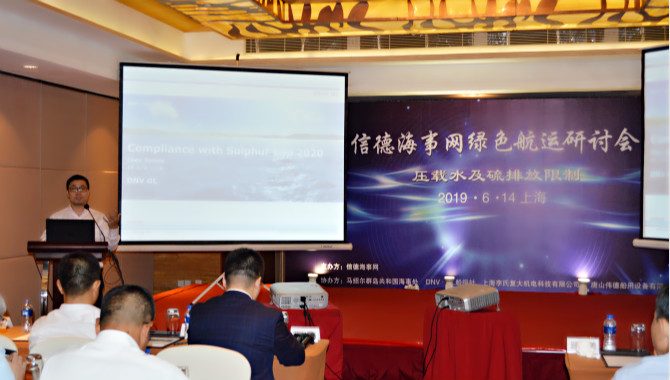Ship owners have been taking actions in order to comply with 2020 Sulphur Cap. Open loop scrubber with LSFO would be a better solution from a overall perspective.

During Xinde Marine News Green ShipTech Seminar held last week at Shanghai, the latest statisic from DNV GL shows that there’re 3553 ships which are installed with scrubbers, another 318 choose LNG fuel and 352 ships opt for battery power among the total number of the ships which use alternative fuels.
In the total number of ships installed scrubbers, out which 2807 choose open loop scrubbers, 646 with hybrid ones and only 65 with closed ones. Among them 2630 are retrofits and 924 are newbuildings.
2020 Sulphur Cap will have effects on global bunker demand. For example, HFO will drop dramatically; LNG will not play a major rola in the near future; distilliates and LSFO will take the role of HSFO; alternative technologies or fuels will be allowed to enter the stage; average bunker cost will increase. And obviously there’ll be uncertainties due to the development beyond 2020. Therefore open loop scrubber with LSFO would be a better solution for ship owners.
Guidelines in case of failure and recommended actions for Exhaust Gas Cleaning Systems according to MEPC.1/Circ.884 are that ships are not expected to deviate from a voyage to repair the EGCS, but if compliant fuel are carried on-board it must shift to this fuel. Action to bunker compliant fuel or carry our repair work must be agreed with the relevant authorities.
An Exhaust Gas Cleaning System (EGCS) malfunction is any condition that leads to an emission exceedance, with the exception of
-- Short-term temporary emission exceedance: E.G. the EGCS dynamic response when there is a sudden change in the exhaust gas flow rate to the EGCS.
-- Interim indication of ongoing compliance in the case of sensor failure: If a
malfunction occurs in the instrumentation for the monitoring of Emission Ratio or discharge water (pH, PAH, Turbidity), the ship should keep records of interim indication for demonstrating compliance (e.g. flow rates, pressures, …)
Any EGCS malfunction that lasts more than one hour or repetitive malfunctions (of less than one hour) should be reported to the flag and port Stateʹs Administration along with an explanation of the steps the ship operator is taking to address the failure.
At their discretion, the flag and port State's Administration could take such information and other relevant circumstances into account to determine the appropriate action to take in the case of an EGCS malfunction, including not taking action.
The opinions expressed herein are the author's and not necessarily those of The Xinde Marine News.
Please Contact Us at:
admin@xindemarine.com


 Ningbo Containerized Freight Index Weekly Commentar
Ningbo Containerized Freight Index Weekly Commentar  Ningbo Containerized Freight Index Weekly Commentar
Ningbo Containerized Freight Index Weekly Commentar  Ningbo Containerized Freight Index Weekly Commentar
Ningbo Containerized Freight Index Weekly Commentar  BIMCO Shipping Number of the Week: Bulker newbuildi
BIMCO Shipping Number of the Week: Bulker newbuildi  Ningbo Containerized Freight Index Weekly Commentar
Ningbo Containerized Freight Index Weekly Commentar  Ningbo Containerized Freight Index Weekly Commentar
Ningbo Containerized Freight Index Weekly Commentar